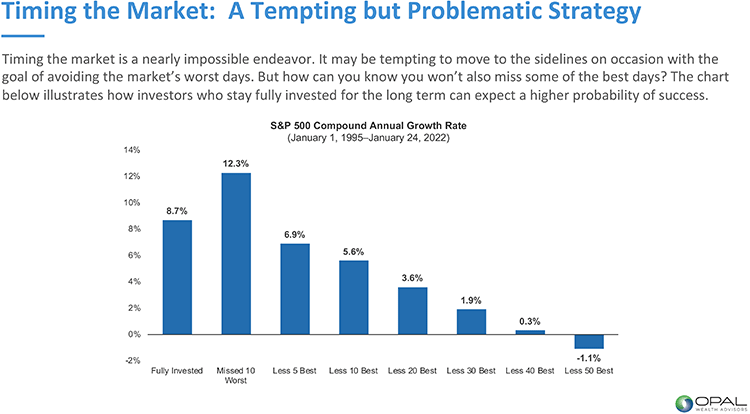What Recent Market Volatility Means for Your Investments
By Lee Korn | February 25, 2022It’s been a turbulent beginning of the year for the stock market, which has many investors on edge. A number of global and domestic issues are disrupting market activity. The Russia-Ukraine conflict, inflation, and ongoing supply chain backlogs are stirring the pot. Meanwhile, interest rates are simmering in the background and will likely increase in the near future. Late January saw significant swings. More recently, the S&P 500 recently fell into a correction for the first time in two years, dropping more than 10% from its recent high.

Market corrections are actually more common than you might think, but they can still feel tough to stomach—especially when sensational headlines are making you feel even more uneasy. You may have the instinct to pull your investments during bouts of market volatility, but you may want to reconsider. Here’s why.
A Market Correction Doesn’t Necessarily Signal a Bear Market
The market typically sees three to five corrections annually—and a 10% to 15% correction per year on average. While some have accelerated into bear markets, which occurs when there’s a 20% drop from a recent high, most corrections represent temporary dips. More often than not, the S&P 500 actually ends the year higher following a correction. But watching things bounce up and down in the meantime can feel unsettling.
As investors prepare for interest rates to begin creeping upwards again, we’ll likely see market volatility return. It’s important to remember, however, that sporadic downturns don’t mean that the market is staying down. Rising interest rates actually indicate that the economy is improving and growing on its own. This, in turn, spurs stock market growth.
With regard to geo-political factors (most notably Russia’s invasion of Ukraine), market impact is typically tied to current economic health. When there are no signs of a recession, history shows that these types of conflicts usually cause short-lived volatility. Sharp and fast declines are normal, but things tend to rebound fairly quickly. While we are troubled by the humanitarian impact of the invasion, most data points suggest the economy is strong and a recession is not on the horizon. The fact that we’re now down over 10% on most stock market averages suggests that we may be nearing a bottom—and now may be a time to dial up market activity, as opposed to exiting. Just as investors can use inflation to their advantage, better understanding market volatility can actually help grow your wealth.
Staying the Course Is Most Important
There is no shortage of headlines stoking fear and anxiety among investors. Our best advice is to be mindful not to fall victim to media sensationalism that’s designed to keep you glued to your TV. The truth is that markets are complex, and reacting emotionally will likely lead you down the wrong path. As illustrated below, trying to avoid the worst market days will probably come back to bite you.

Numbers like these highlight the inherent flaws of trying to time the market. What’s more, most investors are playing the long game—volatility that crops up in the short term shouldn’t have too big of an impact on your long-term investment plans.
Staying fully invested is the best approach. Otherwise, you could miss out on future returns when the market rebounds. Adopting an “out of sight, out of mind” mentality can work to your advantage here. A recent CNBC survey found that nearly half of investors check their investments’ performance at least once a day. We highly advise against obsessively monitoring your investments. Watching your balances go up and down in real time can rattle your better judgement. Just as frequent social media activity leads our minds to comparison and anxiety, frequent market watching could lead to investment mistakes.
That doesn’t mean you should necessarily do nothing in the face of market volatility. Every person’s financial situation, long-term goals, and risk tolerance are different. The best response is staying fully invested with the guidance of an experienced financial professional. Now is actually a great time to review your overall investment plan and rebalance your portfolio accordingly.
At Opal Wealth Advisors, we’ve been busy helping investors reposition their portfolios for expected opportunities over the next several years. We’re also strongly urging folks to have cash available for short-term obligations. You can also put your cash to work in other ways. When the market dips, stock prices go down with it. Depending on your age and investment timeline, you could buy more now while stocks may be at a discount. Or you could convert funds in a traditional IRA to a Roth IRA and pay less tax on the conversion.
Beyond that, we’re focused on finding the opportunities that could be hiding in this volatility. Taking a strategic investment approach can position your portfolio to grow over the long haul. Connect with us sooner rather than later so we can explore what this all means for your finances.
Be a Smart Investor
Stay up-to-date with industry-leading information and news delivered straight to your inbox.
Get our timely insights delivered to your inbox (Blog)
Please remember that past performance may not be indicative of future results. Different types of investments involve varying degrees of risk, and there can be no assurance that the future performance of any specific investment, investment strategy, or product (including the investments and/or investment strategies recommended or undertaken by Opal Wealth Advisors, LLC [“OWA]), or any non-investment related content, made reference to directly or indirectly in this commentary will be profitable, equal any corresponding indicated historical performance level(s), be suitable for your portfolio or individual situation, or prove successful. Due to various factors, including changing market conditions and/or applicable laws, the content may no longer be reflective of current opinions or positions. Moreover, you should not assume that any discussion or information contained in this commentary serves as the receipt of, or as a substitute for, personalized investment advice from OWA. OWA is neither a law firm, nor a certified public accounting firm, and no portion of the commentary content should be construed as legal or accounting advice. A copy of the OWA’s current written disclosure Brochure discussing our advisory services and fees continues to remain available upon request or at www.opalwealthadvisors.com. Please Remember: If you are a OWA client, please contact OWA, in writing, if there are any changes in your personal/financial situation or investment objectives for the purpose of reviewing/evaluating/revising our previous recommendations and/or services, or if you would like to impose, add, or to modify any reasonable restrictions to our investment advisory services. Unless, and until, you notify us, in writing, to the contrary, we shall continue to provide services as we do currently. Please Also Remember to advise us if you have not been receiving account statements (at least quarterly) from the account custodian.



